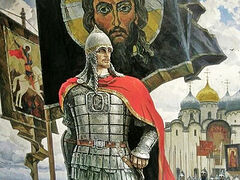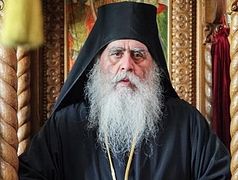At one of the recent meetings of the sisters of the St. Elisabeth Convent in Minsk, the spiritual father of the monastery, Fr. Andrew Lemeshonok, and the sisters spoke about how not to lose God’s grace in the turbulent flow of life, when the world demands its own, when values are changing rapidly, and so many temptations appear. We offer here a fragment from the sisters’ meeting.
Archpriest Andrew Lemeshonok: The drama of this world, which has decided to live without God, is unfolding before our very eyes. The world of sin is gaining momentum, destroying the concepts of holiness, homeland, responsibility, and family—the fundamental concepts without which life would have, until recently, seemed impossible.
And to survive in this world, you have to have some support. The more complicated the circumstances around us, the stronger we must cling to Christ and learn to live according to the rules of the Holy Orthodox Church. When a man eases up, when he falls into the stream, into the crowd, he ceases to control himself, yet becomes part of this crowd. And where are the people going—to repent, to go on pilgrimage, to do something good? Or do they themselves not know where the world is leading them?
How quickly everything changes. Church people say today: “My children don’t keep the fasts, but at least they didn’t eat candy—and thank God for that.” But at the time when I came to the faith, there simply could not have been such conversations among the Orthodox.
This world accustoms us to thinking differently, to different values, and we put our “I” and our desires ahead. That is why the life of the holy fathers—St. John Climacus, Abba Dorotheos—bewilders us. Their faith and ascetic way of life doesn’t fit into our minds. Today, it’s impossible to tell someone: “Leave your arguments and opinions and listen to me;” “No one’s asking you your opinion—do as they say.” This is immediately perceived as terror and a mockery of the individual. So we have to say: “Do as you please; God help you, sister.”
Today all ties built on respect for elders, obedience, humility, and not to mention love, are being severed. The world is doing everything it can to depersonalize a man, to make him part of the crowd that isn’t being led by the bright spirits and certainly isn’t being led to the Kingdom of Heaven. I am not speaking on the scale of our country or even Holy Rus’, but on a global scale, which is now entangled in that web. Even first graders have phones, and there he learns how to build relationships with parents and teachers. And this can’t but enter into the Church. After all, people from the world come into the Church with their experience, values, and concepts, and many believe their experience is more progressive. Supposedly a new age has come—the age of reason and progress, when many important things are called into question. Even the Divine Liturgy—the Mystical Supper, Christ, Who communes His disciples and leads them to a new, eternal life—is called into question. That’s scary!
To build a monastery in this world is the ultimate madness. But God gives grace and we accept it. And God’s grace changes us, who are infected with sin. Such unity in God is a miracle of God’s love. And we are talking about holiness, faithfulness, purity, beauty—about God, Who, despite all human efforts, holds this world in His hands. The Lord has conquered the prince of this world and wants us to live by this victory. Each of us bears responsibility for our choice of where to go and who to follow. And Christians need to think even more carefully and look for where Christ is and where He simply cannot be.
It’s very important to keep the faith. Christ is and will be in our midst, although the world tries everything it can to deprive us of communion with God, to break the connection of the soul with God, and to bury the soul forever. Forever. And it succeeds. There is a battle on for every person, every soul. And it escalates. That is why it is so difficult to get through to young people and open their eyes—because they have been taught that they know more, that they understand better.
Remember how the Soviet Union collapsed with lightning speed; it was the same with the mighty Russian Empire, which our ancestors had built up for centuries. How much blood was spilled to build such an empire! And then it collapsed overnight. Everything occurs much faster now. It’s enough to push a button and everyone will know where to go, how to behave. And, unfortunately, people have confidence in this. But who is speaking and why—they don’t even think about this anymore. Therefore, we have to have our own “internet”—prayer for one another, meaning our connection with one another through God. And if we lose this connection, then, of course, we will go the wrong way.
Sister Veronika Charkovskaya: We have many people in our families who suffer from alcoholism, smoking, drug addiction. I’m very concerned about gambling addiction too. About a year ago, I was reading an article from Abbot Ephraim (Vinogradov-Lakerbay) from Valaam Monastery (in Great Lent 2017, Abbot Ephraim was tonsured into the Great Schema with the name Gabriel—Russian Ed.). He very deeply illuminates this issue. In short, it’s the road to hell. And, unfortunately, many parents themselves are sending their children there: “We’re going to sit in the kitchen for a while—you go play some computer games.” In the shelter where I worked in my spare time, they also played computer games. In my view, this is a critical issue for the modern world.
My ex-husband is a programmer. He and his friends were always distracted from their work, diluting their mental work with sports, art, other work. We loved to go to the dacha, where my husband would do physical labor from morning till evening. And when he took a woodworking course—which, by the way, was quite expensive—all four of the students turned out to be programmers. My husband also practiced yoga, but, unfortunately, it didn’t allow him to accept my going to church. Out of love for me, he proposed we get a divorce. And now I have another bridegroom—Christ, and He tells me to take up my cross.
Fr. Andrew: We have one brother who would drive the sisters around during the day and play video games at night. An adult, four kids—and video games! Nature abhors a vacuum. If someone stops working physically, stops talking with his family, how can you pull him away from this tiny screen, where his whole life is now? Only grace can work here.
But we have to sow even on a rock. We have to talk about it, to show different examples. In general, I believe that until someone enters the Church and lives on his own, until he has communion with God through confession and Communion—he has nothing with which to oppose this world. That means it’s easy to tempt him and offer him something counterfeit. But all this gradually depersonalizes a man, deprives him of a living connection with his parents, with his friends. Everything is “remote…”
But Christ gathers us in church: For where two or three are gathered together in my name, there am I in the midst of them (Mt. 18:20). But if you stop the services and hold confession and Communion online, will it be a church? A man gets used to living an unreal life in his fantasies and dreams.
Even love is from a distance now: “He lives in London, but I fell in love. We’ve been talking for years.” How can you fall in love with someone without seeing them? It’s a substitution. Try to fall in love when someone’s lurking in front of you for days on end and even talking nonsense! Try to wash your beloved’s laundry, make him something to eat… But such love isn’t needed now, because people are lazy. We’re used to floating through this life, not plowing and sweating for someone else. Such people feel sorry for themselves and are therefore unreliable. And if we’re lazy in ordinary life, we’re lazy in the spiritual life too, because the spiritual life is much more difficult. You have to spill blood to get the Spirit.
And parents are constantly at work now. They try to earn money to provide for their children: “Here’s some money, go play.” The only thing that can really be done, I think, is to bring the family to church and start life anew. But not everyone has the resolve to do this.
Sister of Mercy, Zinaida Lobosova: Many sisters, myself included, saw the film “Adam, Where Art Thou?” about Dochariou Monastery on Mt. Athos. The monastic life is shown in perfect simplicity in this film, as it is. You see how monastics live and labor—peacefully, selflessly. And during a tonsure, the abbot weeps and says this is all for the sake of the Heavenly Kingdom, to save the soul.
And here I am, a person of the world, watching a film about the life of a monastery, where there are, all at the same time, cats and dogs, tonsures, hard work, and falling asleep sitting in a chair. And at the end, the full-screen title: “Adam, Where Art Thou?” I suddenly realized that this is God’s question to everyone. And how can we get away from this question? We can’t. We have to face the music before God. And our worldliness, sin, and powerless from belonging to all of this is revealed…
Fr. Andrew: Where your mind is, there you are. Where is your heart? At the flea market? In the supermarket? At your dacha?
Once I was struck by the answer of the late Fr. Nikolai from the orphanage, when he was asked what he was thinking about. He said: “I’m thinking about today’s Gospel reading.” Can you imagine? In this situation, when he himself was sick and there were sick people all around, his mind was not here. And how often we, standing with our feet in church, go off in completely different directions…
How I would like for as many people as possible to see this movie. They filmed it at Dochariou Monastery. It’s possible you won’t find such occupational therapy as they have in this monastery anywhere else on Mt. Athos—the monks work ten or twelve hours a day there. The film remarkably shows a man with his infirmities when Elder Gregory says: “I made two mistakes—I became a priest, and I became the abbot. It’s easier to sit on a mountain with a flute than to stand at the altar.” It’s a very important moment—human infirmity manifests itself even in ascetics. On the one hand, such a discrepancy tears a man apart, and on the other hand, it humbles him. Otherwise, he would be like Lucifer, saying everything is wrong, I know better, they don’t understand me, they don’t appreciate me…
And another significant and beautiful thought: Monks should take several steps on their own, and the restthe Lord should take. But even these few steps are difficult. As our Nun Martha (Guskova) says after twelve years in the monastery: “I’m only now starting to understand something…” And what can someone who has just come to the Church understand? His mind is askew. It’s good for him to listen and imbibe the words of those older than him. But he doesn’t want to. People live not by obedience but by their own egos—I do what I want to do. It’s the same in a family. But if the children would listen to their parents, how many mistakes could be avoided…
We see ourselves as better than we really are. You stand in obedience, you visit the sick, you find the right words, and you feel that God is speaking through you. And the desire to serve others appears, and compassion, and love… But then you go home, and you turn back into what you really are. It’s a huge contrast that a man has to bear without getting confused and falling into despondency. It’s hard for a proud man to accept that he’s not as good as he thinks he is. But we have to tell ourselves: “I thank God for my service, for the right word, for every encounter. I myself needed them first of all.” This is humility—to understand that God gives me more than I can make room for. Humility is gratitude to God for what you have right now.







